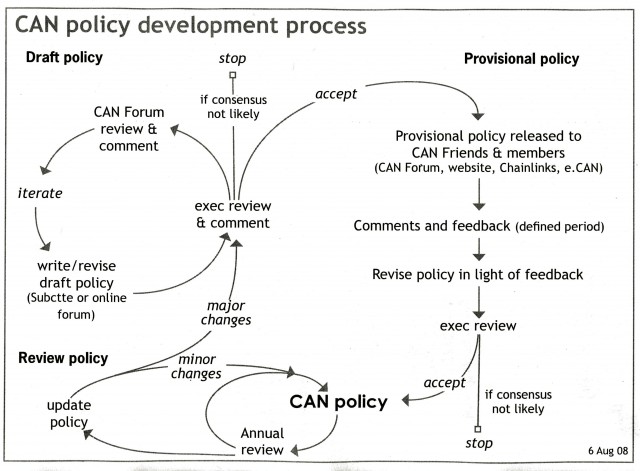Policy Development
This document outlines the methodology for developing, getting consensus and putting in place specific CAN policies.
To background the policy development effort, we have outlined in the diagram the process that is being used to develop policies that the majority of CAN members can support.
 policy diagram
policy diagram
The Policy Diagram
It illustrates a method aimed at obtaining a consensus view that is based on research and evidence - so that any policy is not just opinion and is one that the majority of CAN members can supportt. Final and policies under development are available for reviewing and commenting on.
If the CAN Committee endorses the policy, the CAN Policy Co-ordinator arranges for it to be posted on the CAN website, notifies members in e.CAN and ChainLinks, and it is released to the media and any other known interested parties.
A policy can be revised generally only by repeating the process above. However, minor amendments (for example, to the supporting information for a policy) may be made by the CAN Policy Committee, preferably in consultation with the original policy development group.
Development Procedure
The following outlines the methodology for developing, getting consensus and putting in place specific CAN policies:
1. Someone keen to develop a policy in a particular area suggests as such to the CAN Policy Co-ordinator. The Policy Co-ordinator seeks endorsement from the CAN Policy Committee.
2. The Policy Co-ordinator puts up an initial draft into the CAN Policies area. If the person suggesting the policy is not already a member of the on-line group: the CAN Policy Development Team, they will need to request membership of the group to gain access. If you want to do that, please send a message to the CAN Policy Development Coordinator (email policy@can.org.nz), with a copy to the Webmaster (email webmaster@can.org.nz).
3. The Policy Development Team then develops a first draft of the policy. When thought ready for an initial review by the exec, the Policy Co-ordinator notifies the exec that it is available for their review and includes the exec as part of that policy's audience. It will be available online for both groups for a specified period (typically two weeks).
4. The Policy Development Team incorporates comments as it sees fit and any further debate occurs. When thought ready, the Policy Co-ordinator extracts the draft policy, inserts it into the policy template then forwards and issues the policy as a second draft PDF file to the Committee and CAN Forum for a specified period (typically two weeks).
5. The Committee may terminate the policy development process at this stage if it appears that CAN opinions are diverse and if it feels that a consensus policy document, widely supported by CAN members, will be difficult to achieve.
6. Comments are returned to the Policy Co-ordinator or posted into the on-line version of the draft policy. The Policy Co-ordinator then puts any returned comments into the on-line version of the draft policy.
7. The Policy Development Team incorporates comments and makes changes as it sees fit. When ready, the Policy Co-ordinator extracts the draft policy, inserts it back into the policy template and creates a PDF version of the policy. The Policy Co-ordinator then issues the policy as a provisional policy to the Committee and to the CAN Forum, changes the status of the online version of the policy and uploads the PDF file to the website.
8. The provisional policy will be sent to the editor of ChainLinks for publication, with comments requested from members (or other interested parties) within three weeks of the ChainLinks mail-out.
9. The next e.CAN (CAN electronic newsletter) will include a link to the provisional policy on the website and request members' comments by a specified date (to coincide with the ChainLinks feedback date).
10. Comments are either returned to the Policy Co-ordinator or posted into the on-line version of the provisional policy. The Policy Co-ordinator then puts any returned comments into the on-line version of the provisional policy.
11. The Policy Development Team modifies the policy as it sees fit, based on responses from CAN members and any other views. When no more comments are forthcoming, the Policy Co-ordinator extracts the updated policy, inserts it back into the policy template and creates a PDF version of the policy. The Policy Co-ordinator then issues it to Committee to determine whether the policy can be released as a CAN policy. The exec may terminate the policy development process at this stage if it appears that CAN opinions are diverse and if it feels that a consensus policy document, widely supported by CAN members, will be difficult to achieve.
12. When and if the Committee endorses the policy, the CAN Policy Co-ordinator uploads the approved PDF version onto the website. The status of the policy is modified to "approved" status. The release of the policy is notified in e.CAN and ChainLinks, and released to the media and any other known interested parties as needed.
13. Each approved policy will be reviewed annually to see if any alteration is needed.
14. Any approved policy can be substantially revised only by repeating the process above. However, minor amendments (for example, to the supporting information for a policy) may be made by the Policy on-line group.
The CAN Policy Co-ordinator:
- Aims for at least five policies per year to be developed
- Keeps the policy template up to date
- Administers the on-line policy development group
- Keeps in contact with each policy development leader regarding progress and feedback
- Keeps a copy of each significant version of the policy (first draft, second draft, provisional policy and CAN policy) as it is developed
- Maintains a record of policy development including the date of issue for each policy.
| Attachment | Size |
|---|---|
| 41.79 KB | |
| 92.09 KB |
